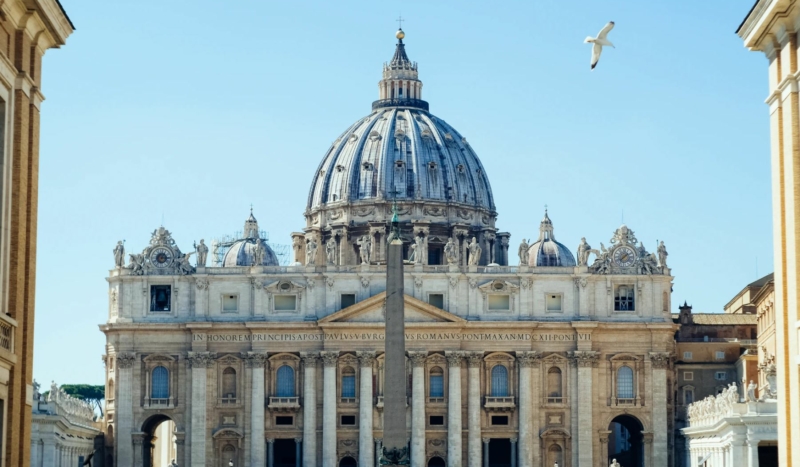
Should Catholics accept everything a pope or bishop says with blind obedience? How do we know when our love of Christ demands intellectual and spiritual submission… and when we are free to disagree?
It is one thing to disagree with bishops’ conferences over specific applications of Catholic social teaching to current affairs. It is quite another to demand that the Church “revisit” (meaning, revise) her teaching on mortal sin, contraception, human sexuality, the ordination of women, salvation, and the divinity of Christ.
Here’s a quick explainer on the all-important distinction between dissent and disagreement. And why our salvation depends upon it.
Dissent vs. Obedience
Dissent is when Catholics simply decide to stop being Catholic with regard to a specific Church teaching.
Heretics have objected to established doctrine since the earliest days of the Church. You can probably name famous examples of people who dissented from teachings like: Jesus Christ is true God and true man; sexual relations are reserved for those bound by the Sacrament of Matrimony; only a male can stand in persona Christi at the altar.
Dissent from the teachings of Christ always separates us from Christ himself, and it almost always excuses some form of sin. Calls to “rethink” Church teaching often begin with “the lived experience” of Catholics already living in ways contrary to Church teaching.
Whether we are acting or thinking “with Christ” isn’t determined by our “lived experience” or the sincerity of our intentions. Dissent is objectively wrong, easily identifiable, and always self-destructive. It leads inevitably to suffering – most often the suffering of the innocent, the simple, or the unwary.
When the Sacraments of Initiation make us Catholic, we are forever bound to “think with” the Church. The word “obedience” comes from the Latin “to give ear to, to follow guidance.” Our firm hope is that when we conform our lives to Christ’s teaching, the truth sets us free. In what converts often experience as a divine plot twist, Catholic obedience is true freedom.
“No identity is recognizably Catholic if it skirts the question of obedience,” wrote the late Father Richard John Neuhaus. Catholic identity isn’t something that “takes care of itself.” We are recognizably Catholic only insofar as we are obedient in what matters.
We can have difficulties with a teaching or struggle to accept it interiorly, but, as St. John Henry Newman said, “Ten thousand difficulties do not make one doubt.” Persevering in obedience even through great difficulties bears great fruit. In contrast, doubt or dissent in matters of faith and morals is a chronic spiritual (and often material) disease. Untreated, it is fatal.
Disagreement
On the other hand, a Church without a sense of what healthy disagreement and discourse entails is also a sick Church. Archbishop Anthony Fisher, OP draws a distinction between the responsibilities of the hierarchy and other public Church leaders, however, and lay Catholics involved in the public square: “The vocation of other Catholics, such as politicians, lawyers and judges, is a fortiori to take the initiative in civilizing and making more humane and moral the affairs of human society.”
This is where disagreement comes in.
Lay Catholics can be completely obedient to the teachings of the Church and at the same time disagree – even diametrically – with other Catholics, including bishops and priests, on how to apply that teaching politically.
Doctrine requires the submission of the intellect and will. For example, many bishops regularly remind American Catholic voters that they must reject politicians who advance abortion and false definitions of marriage. If Catholics don’t conform their actions in their public lives – such as in voting or campaigning – to Catholic doctrine, they separate themselves from their Catholic identity.
But when bishops issue statements supporting particular policies or political strategies, lay Catholics are also bound to scrutinize their judgment and ask: Will this policy actually work on the ground? Will it result in the good ends it is intended to accomplish? Is this the best way we can live out Catholic social teaching in America today?
The Remedy
There is no question that this distinction is lost on many Catholics – and most non-Catholics – in our current culture. Public dissent is fashionable and rarely rebuked – and intra-Church disagreements over legal policy are too often mischaracterized by one side as rejections of Church teaching on the part of the other.
A good answer will start with a clear distinction between dissent and disagreement, a unified rebuke of all public dissenters, and an intentional fostering of legitimate debate.
The remedy to a Church ridden with dissent is a Church that understands what are the unchanging teachings of Christ and what are matters of prudence. But more than understanding, both bishops and laity must also live those teachings in their entirety and debate matters of prudence with humility and charity.
Read more >> Vatican II, On Religious Liberty (1965), §§2,3; The Church in the Modern World (1965), §16)
Read more >> Romans 2:15 – 16
